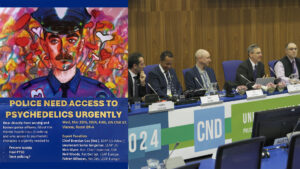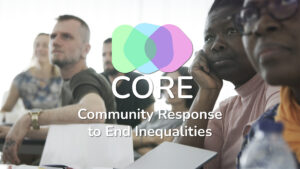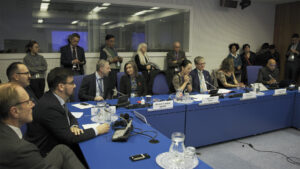More than 50 professionals from 26 countries supported the SignOn letter circulated by the Hungarian Civil Liberties Union.
The SignOn is part of a recent campaigne aiming to pressurize the government to improve the funding system of service providers and reform drug laws in Hungary.
According to recent news, the government started to transfer the money to the service providers – the campaigne did its share. Even if it seems improbable that the government will do any attempt to reform the Penal Code until the next parlamentary elections (May 2006), this petition contribute to raise awareness to the severe barriers of treatment and prevention efforts. The SignOn had wide coverage in the Hungarian media, three major newspapers reported the HCLU's press release in front pages:
Text of the letter:
To: Mr. Ferenc Gyurcsány, Prime Minister of Hungary
Miniszterelnöki Hivatal
1055 Budapest Kossuth Lajos tér 1-3.
Dear Mr. Prime Minister!
Harm reduction programs, such as needle exchange and methadon maintenance therapy play a crucial role in the global fight against blood born diseases, especially HIV/AIDS and Hepatitis B, C. According to the World Health Organization (WHO), there is compelling evidence that increasing the availability of sterile injecting equipment by injecting drug users reduces HIV substantially [1]. The WHO, together with the Joint United Nations Program on HIV/AIDS (UNAIDS) and the United Nations Office on Drugs and Crime (UNODC) recently produced a joint position paper in which they note that substitution therapy is „one of the most effective treatment options for opioid dependence” [2]. In 2005 WHO adopted methadone to its lists of essential medicines, which „are intended to be available within the context of functioning health systems at all times in adequate amounts, in the appropriate dosage forms, with assured quality and adequate information, and at a price the individual and the community can afford”. [3] The Hungarian government committed itself at the United Nations General Assembly Special Session (UNGASS) dedicated to HIV/AIDS (25-27 June, 2001) to ensure that a wide range of prevention services will be available for vulnerable populations by 2005, including access to sterile syringes and voluntary and confidential counseling and testing [4].
Apart from international recommendations and commitments, the government have an obligation to implement the „National Strategy to Combat the Drug Problem”, accepted with the full consensus of the Hungarian Parlament in the year 2000. [5] The Strategy calls for the establishment of at least one methadone maintenance treatment per region in the shorter term (6.3.4.3) and a significant improvement in the access to treatment in the longer term, that is, until 2009. However, despite the strong efforts of Hungarian health and social care professionals to scale up harm reduction programs in the country, the governments so far failed to provide an appropriate funding system for these life-saving services. Coverage of both substitution treatment and needle exchange programs is well below ten percent among injecting drug users – a rate clearly unsufficent to prevent the spread of blood born diseases. Contrary to the short term goals of the National Strategy, there are still several regions with significant injecting drug user population not covered by any harm reduction programs.
The government often declares its intention to approach drug problems from social and health perspectives instead of the criminalization of drug users but the facts show a different picture:
· the government so far failed to propose a new drug legislation which meets with the expectations of the vast majority of professionals working in the field (to decriminalize drug use per se to facilitate effective social and health care) and it did not create the legal background of an effective funding system;
· the government curtailed the budget of the the Drug Coordination Office of the Ministry of Youth, Family, Social Affairs and Equal Opportunities (MYFSAEO) last year (1686,1 Million HUF in 2003; 1781,1 Million HUF in 2004; 996,0 Million HUF in 2005). Consequently, NGOs working on the field have much less resources.
Operating harm reduction services often face shortage in moral and financial support and hostile criminal law enforcement practices:
· the most significant methadone maintenance clinic (Nyírő Gyula Kórház Drogambulanica, Budapest) had to stop recruiting new clients recently because of financial problems, applicants are set to waiting lists
· one of the most visited needle exchange sites (Drogprevenciós Alapítvány, Budapest) have to close its doors without urgent governmental intervention
· According to the position of the Office of the Public Prosecutor of Hungary, police have to start criminal investigation if they observe any object which „refers to the suspition of crime”. [6] Among these objects can be used syringes returned to needle exchange sites by responsible drug users. This policy lands all street outreach and needle exchange activites in serious difficulty.
Dear Mr. Prime Minister!
We, the undersigned health and social care professionals and activists from various countries ask you to make urgent steps to stabilize and normalize the financial and legal situation of harm reduction services in Hungary. We recommend you
1) to promote new criminal legislation and law enforcement practice to avoid the criminalization of drug users;
2) to improve the funding system of service providers working on the reduction of drug related harms;
3) to provide appropriate budget to implement the requirements of the National Drug Strategy and ensure access to recently frozen funds.
Sincerely,
|
NAME |
INSTITUTE/ORGANIZATION |
COUNTRY |
|
Daan van der Gouwe |
Trimbos Institute |
Holland |
|
Aleksandrs Molokovskis |
HIV Prevention Programme at Kekava |
Lattvia |
|
Holly Catania |
International Center for Advancement of Addiction Treatment |
U.S. |
|
Alex Wodak |
Alcohol and Drug Service, St. Vincent's Hospital |
Australia |
|
Paul Hardacre |
Asian Harm Reduction Network |
Thailand |
|
Catalina Iliuta |
ARAS and (RHRN) Romanian Harm Reduction Network |
Romania |
|
Anna Lyubenova |
Initiative for Health Foundation |
Bulgaria |
|
Valeriy Pakhomov |
Odessa Regional Charity Foudation |
Ukraine |
|
Petr Nikitenko |
Charitable Foundation “For Healthier Society” |
Russia |
|
Dmitry Usenko |
SYLAF |
Kyrgiztan |
|
Olena Nechosina |
“Coalition of HIV-servicing NGOs” |
Ukraine |
|
Olga Fedorova |
Moscow Helsinki Group |
Russia |
|
Vitalij Polonets |
Charitable Foundation “Stalist” |
Ukraine |
|
Tatiana Evlampieva |
Irkutsk Red Cross |
Russia |
|
Julia Vinckler |
NGO Convictus Eesti |
Estonia |
|
Nikos Dedes |
EATG – European AIDS Treatment Group |
Belgium |
|
Wim Vandevelde |
GAT – Grupo Português de Activistas sobre Tratamentos de VIH/SIDA |
Portugal |
|
Mauro Guarinieri |
The Global Network of People Living with HIV/AIDS (GNP+) |
Italy |
|
Radka Argirova |
Chief of Lab. for Retroviruses, Natl Center of Infectious and Parasitic Disease |
Bulgaria |
|
Aleksandrs Molokovskis |
HIV Prevention Programme at Kekava |
Lattvia |
|
Volker Mertens |
German AIDS Foundation |
Germany |
|
Marek Zygadlo |
Krakow Association of Help for Drug Addicts (KTPU) |
Poland |
|
Grazyna Konieczny |
Social AIDS Committee |
Poland |
|
Emmanuel Trenado |
AIDES, National HIV/AIDS Community-based NGO |
France |
|
Ton Coenen |
Aids Fonds * Soa Aids Nederland * STOP AIDS NOW! |
Holland |
|
Stijn Goossens |
Breakline Peer Support |
Belgium |
|
Milena Naydenova |
Hope-Sofia |
Bulgaria |
|
Martine Hutsebaut |
Debed Vzw (League for an Emancipatory Drugpolicy) |
Belgium |
|
Yulia Burganova |
Public Opinion Survey and Social Research Center, Yaroslav |
Russia |
|
Tatiana Rumyantseva |
Municipality institution “Public Opinion Survey and Social Research Center” |
Russia |
|
Martine de Schutter |
AIDS Action Europe, the Pan European NGO Partnership on HIV and AIDS |
Holland |
|
Andria Efthimiou |
John Mordaunt Trust |
U.K. |
|
Joep Oomen |
European Coalition for Just and Effective Drug Policies, ENCOD |
Belgium |
|
Maria Georgescu |
ARAS – Romanian Association Against AIDS |
Romania |
|
Eberhard Schatz |
CORRELATION network |
Holland |
|
Willemijn Los |
Amsterdam Drug Users Union (MDHG) |
Holland |
|
Lorena Pahovic |
SVIT – Drustvo za pomoc odvisnikom in njihovim druzinam |
Slovenia |
|
Andrey Shiryaev |
AIDS.Uz — Uzbekistan's HIV/AIDS related issues Internet portal |
Uzbekistan |
|
Zarir Simrin |
PASSAGE Association for Potection of Drug Users Rights |
Macedonia |
|
Henrik Arildsen |
Hiv-Danmark |
Denmark |
|
Lars Steinov |
Ambulatory Enghaven Copenhagen V |
Denmark |
|
Katarina Jiresova |
ODYSEUS |
Slovakia |
|
Daniel Wolfe |
International Harm Reduction Development Program, OSI |
U.S. |
|
Raminta Stuikyte |
Central-Eastern European Harm Reduction Network (CEEHRN) |
Lithuania |
|
Xavier Majó Roca |
Programme on Substance Abuse. Department of Health Autonomous Government of Catalonia |
Spain |
|
Nora Stojanovik |
Macedonian Harm Reduction Network |
Macedonia |
|
Bijan Nassirimanesh |
Persepolis, Teheran |
Iran |
|
Birgit Wichelmann-Werth M.A. |
Drug Crisis Center, Frankfurt/M., FDR |
Germany |
|
Ian Harris |
Drug Policy Interest Group |
U.K. |
[1] WHO, Effectiveness of Sterile Needle and Syringe Programming to Reduce HIV/AIDS Among Injecting Drug Users (Geneva, 2004).
[2] WHO, UNAIDS, UNODC, Position Paper: Substitution Maintenance Therapy in the Managemant of Opioid Dependence and HIV/AIDS Prevention (2004).
[3] WHO Model List of Essential Medicines, 14th List, March 2005.
URL: http://whqlibdoc.who.int/hq/2005/a87017_eng.pdf
[4] Keeping the Promise: Summary of the Declaration of Commitment on HIV/AIDS. UNGASS Special Session on HIV/AIDS, 25-27 June, 2001, New York. (UNAIDS: 2002).
[5] National Strategy to Combat the Drug Problem: Conceptual Framework of the Hungarian Government’s Anti-Drug Strategy (Ministry of Youth and Sports, 1999).
URL: http://www.drogfokuszpont.hu/dfp.web?mid=147
[6] Offical letter of the Office of the Public Prosecutor to the National Police Headquarters (14 May, 2005).






